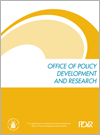
Colleges and universities are redirecting their economic and intellectual resources, facilities, and other assets to benefit their communities in many innovative ways. They are working to facilitate economic development, provide much-needed social services, support public schools, offer technical assistance to community-based organizations, target research that provides guidance for community problem solving, and create opportunities for faculty, students, and community residents to learn from one another.
Current Practices is divided into seven subject categories (organized by how colleges and universities implement them) that comprise the major types of activity of university-community partnerships with local governments or organizations.
- Service Learning: University programs in which students engage in service activities for credit as part of their coursework. Activities may consist of actual coursework or the provision of a community service that is related to a specific course of study.
- Service Provision: Noncredit student and faculty initiatives in the form of coordinated, sustained, long-term projects targeted to a specific community.
- Faculty Involvement: Faculty members who embody the driving force behind activities within the community.
- Student Volunteerism: Activities driven primarily by students. These activities provide students with worthwhile positive experiences while allowing them to fulfill noncredit graduation requirements of volunteerism in community development.
- Community in the Classroom: Specific nondegree, noncredit courses for local residents designed to enhance community building and community capacity.
- Applied Research: Research activities that define needs, guide program planning, assess outcomes, or otherwise contribute to efforts to improve conditions within the community.
- Major Institutional Change: Initiatives that change the mission, promotion and tenure criteria, awards, and course offerings of colleges and universities.


